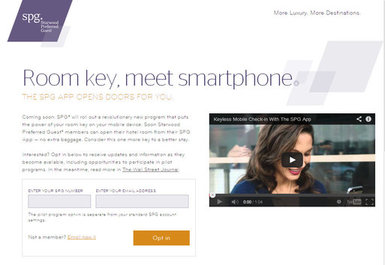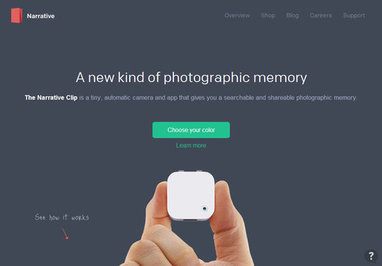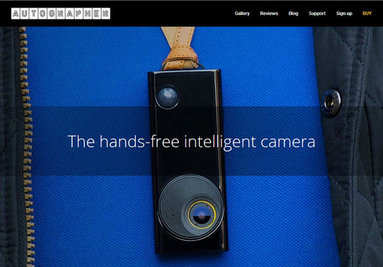Innovative gadgets drive exciting possibilities but fuel privacy concerns
With smarter than smart apps and data-gathering wearable devices on the rise, is privacy a growing concern? Andrew Hennigan investigates
Fictional visions of the future depict either a gleaming metropolis of flying cars or a dystopic nightmare of constant surveillance. Real life turns out to be somewhere in the middle, with some immensely useful gadgets making life – and indeed travel - easier. Think smartphone apps that open hotel room doors, airline staff wearing GoogleGlass to improve customer service, or other life-tracking gadgets.
To save time at reception, for example, Starwood Hotels recently announced the trial of a new room access control system that allows guests to enter their room using only a smartphone app. So far this is only an experiment, but the company indicates that it may one day become a standard and as ubiquitous as free Wifi.

Other hotels have embraced the widespread use of tablet computers, both for guest and staff use, in kerb-side check-ins and other functions involving private guest data (Calling Room Service, EyeforTravel 29 Nov 2012). These tablets and services are hugely popular, though they introduce another risk point where customer data can be compromised – unlike the front-desk computer, they are vulnerable to being physically removed.
In meantime, hotels and resorts are now being faced with another challenge. Wearable devices like GoogleGlass, Epiphany Eyewear and others (2014: Goodbye to the Gimmick, EyeforTravel, 4 Feb 2014) might be popular with their owners and other early adopters, but their ability to record video or take photos almost unnoticed could upset other guests who feel that their privacy is being invaded.
A life worth logging
But GoogleGlass is just the beginning. As wearable technology develops, this problem is likely to become more common. A newer gadget that is both amazingly useful but equally alarming is the ‘life logging’ device Narrative Clip. This is a small badge-like device that clips onto your clothing and snaps a picture every 30 seconds.

The slightly larger Autographer also takes pictures automatically, and even adds GPS to record your position. Later you can upload this data to a server where you can review it, share it or search for it. With a life logger you can capture experiences of a trip or holiday and share it with friends, with almost no any conscious effort.

Yet there are obvious risks. First of all you may not want details of every place you have been, and everything you have seen, to be available to other people. In addition, other people whose paths you cross during the day may be less than enthusiastic.
“The idea of constant data logging isn’t new,” says Tom Kelshaw, director of technology at Metalworks, the creative technology arm of the Maxus media agency. Nike’s Fuelband, for example, has been around for quite a while. Although originally intended for fitness use, tracking health related details and physical wellbeing while travelling can help establish better behavioural patterns and improve levels of comfort.”
For life logging technologies privacy-related questions include: is the location being tagged or tracked? Who is the data being shared with? Is it a closed wall network or a public network? Is the content searchable via Google? Could anything compromise the user? For example, the idea of being logged in a red light district area although you are merely a passerby could be misinterpreted by those who read your posts, says Kelshaw.
While there are clear risks, there is also a potential upside. Chris Nicholson, head of communications at Celery, a pre-order software creator for startups says devices like this will allow the hospitality industry to locate their guests instantly and in real time. Affordable, easy to wear, in constant communication with remote servers and even equipped with panic buttons, this could mean fewer lost or frightened travellers [assuming you have panicky guests] and “a better experience all around,” he says. Secondly, wearables can actually monitor various vital statistics like heart rate, body temperature or movement.
Cause for concern?
In spite of the excitement around new wearables, collecting and storing all this additional data can fuel existing concerns about data protection and privacy. Recent scandals with leaks of passwords and the ongoing revelations about government surveillance are driving more users to be careful with their online footprint, using search engines like Duckduckgo, which do not record user data and secure messaging apps like Telegram.
The most visible of these privacy issues is the use of audio, video and photographic recording devices. Perhaps unsurprisingly, some travel companies are approaching the issue of guest use cautiously. Early adopters of GoogleGlass have already discovered that hotels, resorts, casinos and bars sometimes ask them to avoid wearing them in public areas and some already have a policy defined.
“Guests expect a reasonable right to privacy within the grounds of the hotel,” says Mehdi Eftekari, General Manager of the Four Seasons Hotel Los Angeles at Beverly Hills. “We have revamped our hotel security procedures to recognise individuals who may be engaged in surreptitious filming, recording or any kind of digital privacy intrusion. Our policy is that we do not allow GoogleGlass or any other potentially intrusive digital recording devices to be operated in public areas of our hotel.”
A complex issue
The question of data protection is more complex because it combines compliance with government regulations, embarrassing data leaks and data theft.
“Company boards are increasingly asking questions and getting worried about security and privacy,” says Aurélie Pols, an analytics and information security consultant at Mind Your Privacy. “You can’t open a newspaper today anywhere and not hear about yet another security breach, the Dutch Data Protection Authority going after WhatsApp again, or Obama revitalising his privacy initiative.”
Yet despite concerns, Pols doesn’t see technology adoption slowing down. “So far it hasn’t: the power of those asking the questions is not equal to those driving the business. Financial aspects still dominate, but I think that 2014 will allow companies to put processes in place to vet certain tools and practices better.”
Will there be new legislation to address new devices like smart glasses and life loggers? “I don’t expect legislation to address specific devices despite the chatter regarding GoogleGlass,” says Pols. “For now the US is more focusing on data brokers and there are some proposals for legislation related to this on the table today in the US.”
Meanwhile, companies already have ways to protect themselves. One way to deal with negative PR from data leaks – at least in Europe - is to set up Binding Corporate Rules. “Companies that have done this are less likely to be touched as they have done part of their homework,” stresses Pols.
A Canadian view comes from Ann Cavoukian, Information and Privacy Commissioner of Ontario, who argues that companies handling the personal information of customers should commit to a transparent, privacy protective approach by following the principles of Privacy by Design. This applies the concept of embedding privacy proactively in business processes rather than adding it as an afterthought. According to Cavoukian, by embedding privacy as the default setting, and ensuring user control over how personal information is used, companies will create a long-term relationship based on trust. “It’s what I like to call a significant privacy payoff,” she says.
While devices like GoogleGlass, Narrative Clip and others continue to become smaller, more pervasive and harder to simply outlaw, the volume of data they create is growing exponentially. No doubt an issue that every travel business will have to face – and sooner rather than later.

